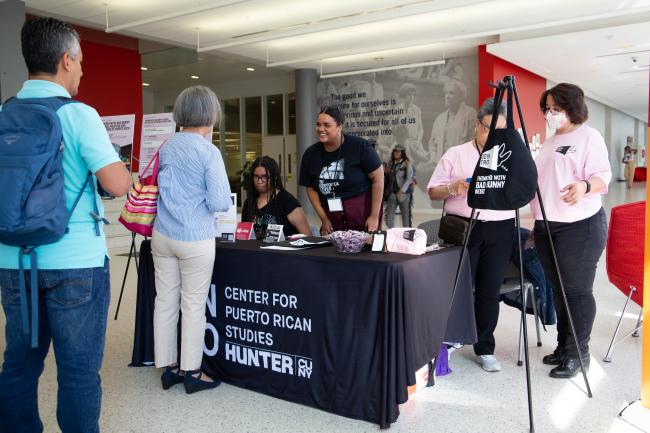
Puerto Ricans are the Latinx vanguards of the East Coast. With mass migration from the island to New York City beginning in the 1950s, Puerto Ricans have transformed and enriched the city in lasting ways through their art, heritage, and multicultural perspective. Musicians like the Fania All Stars infused the city with the rhythm of the clave, while the political ideologies of The Young Lords transformed communities through radical implementations of civil justice. Over the generations, Boricuas have built and led important centers of self-preservation and self-expression that showcase Puerto Rican history, arts, and culture, serving as powerful models of Latinx representation.
This year, four such institutions are celebrating important anniversaries: The Center of Puerto Rican Studies (CENTRO), the largest research center in the United States centering the Puerto Rican experience, and the Nuyorican Poets Cafe, dedicated to poetry and spoken word, are both honoring 50 years. The Clemente Soto Vélez Cultural & Educational Center has been supporting artists and their projects for three decades, and New York University’s The Latinx Project celebrates five years of promoting diasporic arts, culture, and scholarship.
While historically these institutions have been led by men, they have evolved along with the debates around gender politics. Aside from their long and continued legacies, these proudly Boricua cultural institutions are all being shaped by the leadership and vision of Puerto Rican women in a powerful culmination of pushing the boundaries of Latinx existence and creativity forward in the United States.
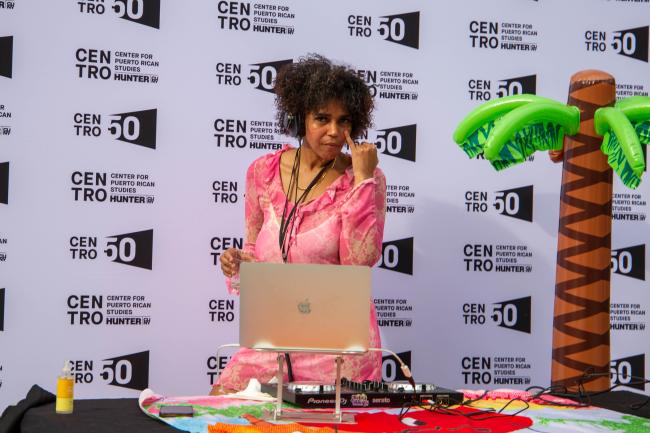
Legacies of Representation
The story of CENTRO began in 1973 when a group of students, faculty, and activists came together to make the university more accessible and relevant to the Puerto Rican community, forming an institution where the Puerto Rican experience in the United States would be researched and archived. The institution emerged from a larger wave of 1960s student movements around the country that fought for the establishment of academic programs like Chicana/o Studies on the west coast and Puerto Rican Studies in midwestern and east coast universities.
In conjunction with these student movements, dynamic Chicano literature and Nuyorican movements emerged alongside The Latin American Boom, in which Latin American writers and intellectuals found success in the United States. These scholarly and artistic movements propelled the creativity and visibility of Latin American and diasporic writers, poets, and artists who were activated by the political and cultural struggles of the time, giving shape to new expressions of consciousness and identity.
The Nuyorican Poets Cafe, also founded in 1973, emerged from this context. Puerto Rican poet and Rutgers University professor Miguel Algarín—along with playwrights, poets, and artists like Miguel Piñero, Pedro Pietri, Lucky Cienfuegos, and Richard August—dared to open a space where poetry and spoken word representing the New York and Puerto Rican experience could be expressed and celebrated at a time when it wasn’t recognized or valued in the mainstream.
The courage of the young Nuyorican poets planted the seeds that would inspire the founding of The Clemente Soto Vélez Cultural & Educational Center, which opened on the Lower East Side in 1993. Formed by a culturally diverse group of artists— Puerto Rican poet Ed Vega Yunqué, Uruguayan actor and director Nelson Landrieu, and Dominican actor Mateo Gómez—The Clemente’s mission was to provide affordable studios for artists and curate performances, exhibitions, and educational programs. Named after the influential Puerto Rican nationalist, poet, journalist, and activist who mentored many Puerto Rican artists on the island and in New York City, The Clemente’s efforts to center Latinx artists and communities came at a time of rapid transformation due to gentrification and the displacement of Latinxs, who had contributed to the city’s richness and vitality.
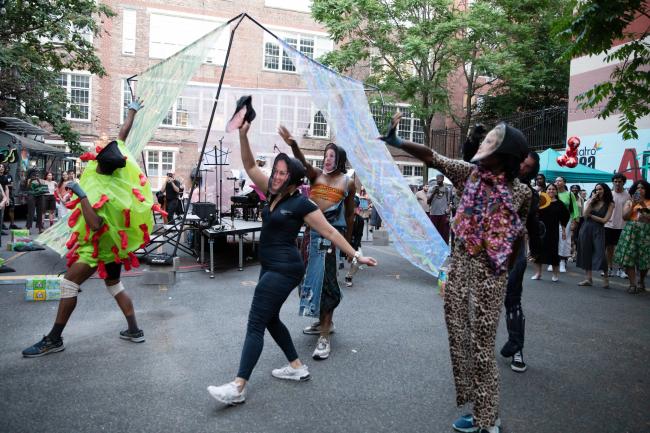
Ongoing conversations around the preservation, present, and future existence of Latinx communities inspired the newest Latinx institution, The Latinx Project at NYU founded in 2018 by anthropologist and professor of social and cultural analysis Arlene Dávila. The center promotes Latinx art, culture, and scholarship through a range of public programming, publications, and the sponsorship of artists and scholars. At a time of both the explosion of Latinx creativity and identity alongside a racist and xenophobic backlash around the country, the Latinx Project places a particular emphasis on “examining and highlighting the multitude of Latinx identities as central to developing a more inclusive and equitable vision of Latinx Studies.”
The Legacy Lives On
CENTRO, part of Hunter College and headed since July of 2021 by Yarimar Bonilla and soon to be led by Dr. Yomaira Figueroa starting in fall 2023, has grown into the largest center for Puerto Rican studies in the country. The institution recently received a $3 million grant from Governor Kathy Hochul to expand its programming and strengthen a new generation of scholarship, celebrated through its recent program Thinking with Bad Bunny: Cultural Politics and the Future of Puerto Rico. The symposium brought together artists, scholars, and community members to be in conversation about a massively successful reggaeton artist as a catalyst to discuss the politics of race, queerness, cultural appropriation, and Latinidad.
For its part, The Nuyorican Poets Cafe was recently awarded a $24 million grant that will significantly expand its reach and programming. The Clemente Center launched LxNY: The Latinx Arts Consortium of New York in 2020, a peer network “dedicated to knowledge exchange, resource sharing, and collective action towards systemic change," and recently collaborated with the iconic Dominican writer and musician Rita Indiana in honor of its 30th anniversary.
The Latinx Project was recently awarded a $1.3 million grant from the Mellon Foundation to expand its programmatic reach and impact.
At this critical juncture for Latinx arts and culture and for their respective institutions, I spoke with Arlene Dávila of the Latinx Project, Libertad O. Guerra of The Clemente, and Caridad del la Luz of the Nuyorican Poets Café about the importance of their work and interconnected institutional missions.
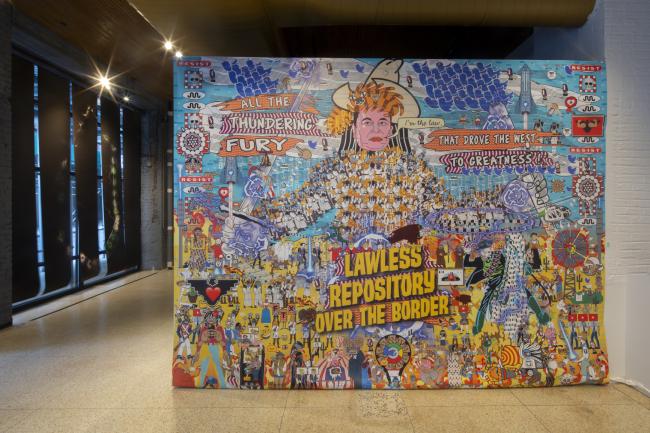
Damaly Gonzalez: What do you think your institution does for the community and for the nation as a whole?
Arlene Dávila (The Latinx Project): It’s an exciting time when we see new Latinx Studies centers being founded across the U.S., which is so overdue. However, as a rule most tend to be social science and research policy based. Humanities and arts centered spaces are very few, so we're filling a lot of voids and hope to become a model to transform the conversation around Latinx studies, hopefully by inspiring other colleagues to carve arts/culture focused spaces in their own institutions which is so necessary and overdue.
Libertad O. Guerra (The Clemente): It has acted as an anchor in a community where everything is in flux, and where a lot of that flux is about erasing the cultural memory embedded in the built environment. We are providing a precedent, an example, that a cultural worker community can self-manage its own affairs.
Caridad de la Luz (Nuyorican Poets Café): What the Nuyorican provides is basically the importance of poetry and the teaching and place to do it. We fill the void where schools aren’t providing arts for students. We fill that gap. The poets that come through and express themselves are at the pulse of humanity. We have a place where we can hear the heart pound. It is a place of trust and a reflection of the African and Puerto Rican diaspora like me.
DG: What do you envision for the future of the Latinx community through the work you're doing today at your organization?
AD: I envision a future where Latinx people, scholarship, knowledge, artists, creators, and more are everywhere as they should be; where there's less need for corrective spaces to fill voids, where it will be impossible to ignore us because the level of awareness about our creativeness would not allow it.
CDL: My goal for the poet’s cafe to become a household name internationally for poetry.
LOG: My hope is that the work we do at The Clemente puts out there who we truly are as communities: the complexities, the contradictions, the beauty, the diversity, the potential, the hopes, the sad history—both here and in the ancestral homelands—but primarily, how our histories connect with the histories of all others that live here.
DG: How would you describe the current moment in which there are four Puerto Rican women heading four prominent Latinx institutions, both for the Latinx community and nationally?
CDL: It reflects what has been true throughout history, that women are leaders. We are the unsung heroes of movements. We know these movements and places exist, but we don’t know it is matriarchal. We are a reflection of what’s been true all along. Even in the Nuyorican Poets Cafe, which only knows the founding fathers. But there are also still living founding mothers.
DG: What do you see as the future of Latinx-centered institutions and the Latinx community in the United States?
LOG: As it pertains to cultural/history/art institutions, they should be responsive to their contexts, and to the particularities of their place-based histories, overlapping with other non-Latinx diasporas, while also generating bridges, solidarities, and potential collaborations with Latinx cultural organizations outside their states.
In my understanding, culture-specific organizations don’t want to be absorbed by the center. Rather, we want to repair the trauma of being silenced by building co-intentional processes in our domains.
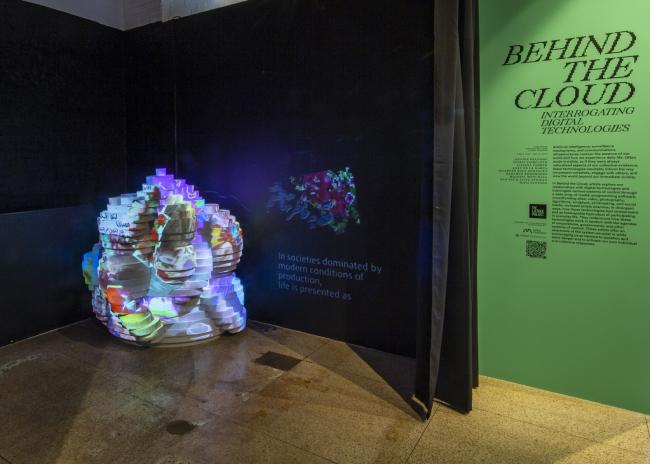
Aside from these extraordinary women, there are several other Puerto Rican women heading prominent institutions in New York City, such as Carmen Diaz-Malvido, Chief Executive Officer at ASPIRA, working to advance Puerto Rican/Latinx youth towards educational excellence; Lourdes M. Rosado, President & General Counsel at LatinoJustice PRLDEF, equipping Puerto Ricans/Latinxs with leadership development in the legal field; Rosalba Rolón, founder of Pregones/PRTT, providing a space for the creation, expansion, and dissemination of Puerto Rican/Latinx performing arts; and Melody Capote, Executive Director of the Caribbean Cultural Center African Diaspora, working to enhance cultural equity in the arts, media, and education for communities of African descendant. Finally, although not a Latinx institution, Marcela Guerrero is the new curator at The Whitney Museum, boosting Latinx art in an institution where it historically hasn’t been valued or understood.
The women leadership of all these institutions have provided me a sense of security and belonging that women of color can thrive despite the past erasure and invisibility we’ve experienced in the face of misogyny and patriarchy. Despite these ongoing systems, we must celebrate these leading institutional legacies and the strides they are making not only in art, culture, and research, but also in gender equity.
Damaly Gonzalez is a Brooklynite, Williamsburg-native of Puerto Rican descent that goes by she/her/hers. She is a culture and identity writer who writes ideas, opinion, and analytical pieces by using stories of everyday life experiences in order to invoke deep conversations and conscious minds. Damaly holds a master’s degree in History and Urban Sociology from The Graduate Center, CUNY. Follow her on Instagram @damalyscorner or Twitter @damalygz.

